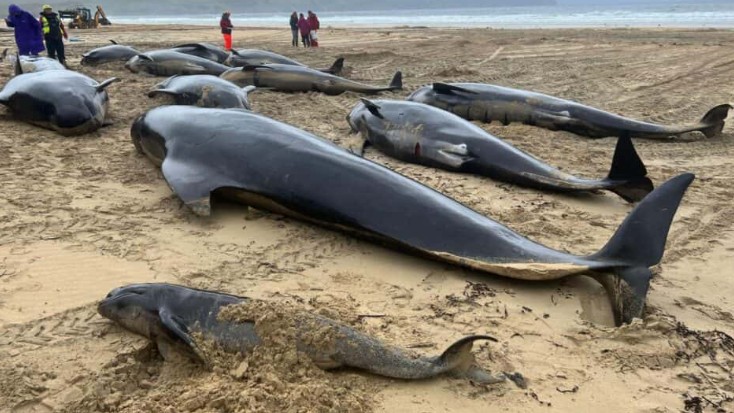Lewis whale pod post-mortem: what caused Britain’s worst mass stranding for 70 years?
Whale beachings are on the rise in the UK, but humans aren’t necessarily to blame

A free daily email with the biggest news stories of the day – and the best features from TheWeek.com
You are now subscribed
Your newsletter sign-up was successful
The scene was like “a war zone but with the bodies whales”, one local told the Scottish Daily Express.
A pod of 55 whales was washed up on Traigh Mhor beach in North Tolsta on the Isle of Lewis on Sunday. Marine rescuers were called to the site on the Outer Hebridean island at about 7am, but soon discovered that only 15 animals were still alive. One whale was successfully refloated, but the rest were euthanised.
This was “the most lethal mass stranding of whales in living memory” in Scotland, said The Herald, and the highest number of deaths following a mass stranding of animals in the UK for at least 70 years, according to BBC News.
The Week
Escape your echo chamber. Get the facts behind the news, plus analysis from multiple perspectives.

Sign up for The Week's Free Newsletters
From our morning news briefing to a weekly Good News Newsletter, get the best of The Week delivered directly to your inbox.
From our morning news briefing to a weekly Good News Newsletter, get the best of The Week delivered directly to your inbox.
Finding out the cause would be a “monumental task”, veterinary pathologist Andrew Brownlow told BBC Radio’s “Good Morning Scotland” programme.
Whale strandings are on the rise in the UK, said CNN, but experts “are still looking for a reason behind the increase”.
‘Strong social bonds’
Pilot whale strandings “have happened for centuries”, said Brownlow, “not necessarily” due to human impact.
The species is “notorious for their strong social bonds”, the British Divers Marine Life Rescue charity said in a statement. The current theory is that the whole pod followed a female who was giving birth. One of the dead whales “appeared to have a vaginal prolapse” and a very young calf was found. A similar case in 2015, which left 21 pilot whales trapped on a beach in Skye, was believed to have been caused by a female calving. She died, alongside two others, but the rest survived.
A free daily email with the biggest news stories of the day – and the best features from TheWeek.com
There are about 2,000 strandings each year worldwide, with most resulting in the death of the animal, said the Fish & Wildlife Foundation of Florida. The beaching of one animal is usually due to sickness or injury. “Bad weather, old age, navigation errors, and hunting too close to shore” can also contribute.
But all the reasons “involve the animals being disturbed”, the Scottish Marine Animal Stranding Scheme said. That could be a predator, unfamiliar surroundings that confuse navigation, earthquakes or “anthropogenic disturbances”. The team will examine the animals to rule out human factors.
‘Sonar testing’
Some scientists believe that sonar used by the military to detect submarines, and other underwater noises, may contribute to beachings, as animals try to escape the sound or panic and surface too quickly. “Mass beachings of beaked whales almost exclusively occur alongside sonar testing,” said the Fish & Wildlife Foundation of Florida.
Scotland’s previous largest stranding was in 2011, when 19 out of a pod of 70 whales died at the Kyle of Durness in Sutherland. A government report blamed the noise of four large underwater bombs detonated by the Royal Navy, said The Telegraph, which could have damaged the whales' hearing and navigation skills.
Mass strandings could be “an indicator that a population is bouncing back”, said Louise Allan, the Natural History Museum’s cetacean strandings support officer. The increasingly regular strandings of humpbacks along the UK coastline since 2001 could be because numbers are recovering since the 1982 ban on commercial whaling.
“Trends can reflect increased population sizes,” Peter Evans, director of Sea Watch Foundation, told CNN, “or simply improved reporting.”
Harriet Marsden is a senior staff writer and podcast panellist for The Week, covering world news and writing the weekly Global Digest newsletter. Before joining the site in 2023, she was a freelance journalist for seven years, working for The Guardian, The Times and The Independent among others, and regularly appearing on radio shows. In 2021, she was awarded the “journalist-at-large” fellowship by the Local Trust charity, and spent a year travelling independently to some of England’s most deprived areas to write about community activism. She has a master’s in international journalism from City University, and has also worked in Bolivia, Colombia and Spain.